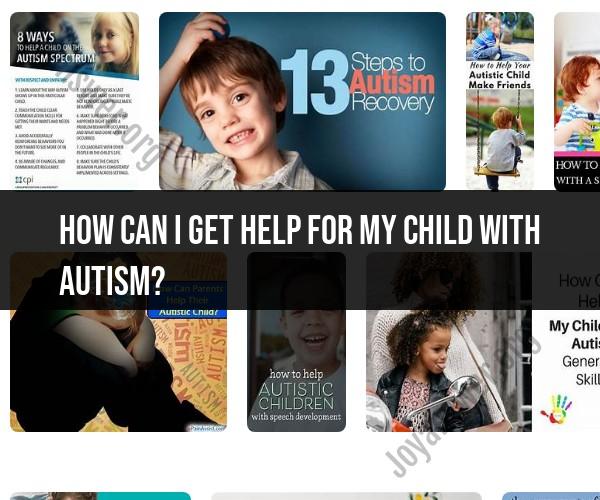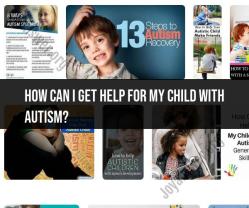How can I get help for my child with autism?
Getting help for a child with autism typically involves a multi-faceted approach that may include early intervention, therapy, education, and support. Here are steps you can take to get assistance for your child with autism:
Get a Formal Diagnosis:
- If you suspect your child has autism, seek a formal diagnosis from a qualified healthcare provider, such as a pediatrician, child psychologist, or developmental specialist. A diagnosis is essential for accessing services and support.
Early Intervention Services:
- Early intervention programs are designed to provide specialized support and services for children with developmental delays or disabilities, including autism. These services can begin as early as infancy. Contact your state or local early intervention program to get an assessment and access services.
Special Education Services:
- Children with autism often qualify for special education services under the Individuals with Disabilities Education Act (IDEA). This may include an Individualized Education Program (IEP) or a 504 Plan, tailored to your child's specific needs.
Behavioral Therapy:
- Applied Behavior Analysis (ABA) is one of the most widely used and evidence-based therapies for children with autism. ABA therapy focuses on addressing behavioral and social challenges.
Speech and Language Therapy:
- Many children with autism experience speech and language delays. Speech therapy can help improve communication skills.
Occupational Therapy:
- Occupational therapy can address sensory and motor skill challenges that are common in children with autism.
Social Skills Training:
- Social skills training helps children with autism improve their ability to interact and communicate with others.
Support Groups:
- Join local or online support groups for parents of children with autism. These groups provide a platform to share experiences, gather information, and find emotional support.
Advocacy:
- Become an advocate for your child's needs. This might involve working with school officials to ensure your child receives appropriate services or advocating for policy changes to improve support for individuals with autism.
Insurance and Financial Assistance:
- Check your health insurance policy for coverage related to autism services. Some states also offer financial assistance programs for children with autism.
Community Resources:
- Explore community resources and organizations that support families with autism. They often offer educational workshops, activities, and guidance.
Additional Therapies and Interventions:
- Depending on your child's unique needs, you may explore additional therapies and interventions such as sensory integration therapy, music therapy, or art therapy.
Plan for the Transition to Adulthood:
- As your child grows, plan for their transition to adulthood. This may involve vocational training, job placement services, and living arrangements that suit their needs.
Keep Detailed Records:
- Maintain records of your child's evaluations, services, and progress. These records can be valuable when seeking services or advocating for your child.
Continuously Educate Yourself:
- Stay informed about the latest research, therapies, and support strategies for autism. Knowledge can empower you to make informed decisions.
Remember that each child with autism is unique, and their needs will vary. It's important to work closely with healthcare professionals, educators, and therapists to create an individualized plan that addresses your child's specific strengths and challenges. Additionally, don't underestimate the importance of emotional support for yourself and your family as you navigate this journey.
How to get assistance for a child with autism
There are a number of ways to get assistance for a child with autism. Here are a few resources:
- Your child's pediatrician: Your child's pediatrician can be a good first step in getting help for autism. They can evaluate your child's development and refer you to specialists for further assessment and diagnosis.
- Early intervention programs: Early intervention programs provide services to children with developmental delays and disabilities, including autism. These programs can help children learn and develop skills in a variety of areas, including communication, social skills, and motor skills.
- School districts: Public schools are required to provide a free and appropriate public education (FAPE) to all children with disabilities, including autism. Schools can provide a variety of services to children with autism, such as special education classes, speech therapy, and occupational therapy.
- Private insurance: Many private insurance plans cover services for autism. Check with your insurance company to see what services are covered and how to access them.
- Government programs: There are a number of government programs that can provide assistance to families with children with autism. These programs can help with the cost of services, such as early intervention, therapy, and special education.
Available resources and support networks for families with autistic children
There are a number of resources and support networks available for families with autistic children. Here are a few examples:
- Autism Speaks: Autism Speaks is a leading autism advocacy and research organization. They offer a variety of resources for families, including information on diagnosis, treatment, and support services.
- The Autism Society: The Autism Society is another leading autism advocacy and research organization. They offer a variety of resources for families, including information on diagnosis, treatment, and support services.
- The National Autism Association: The National Autism Association is a nonprofit organization that provides support and resources to families with autistic children. They offer a variety of programs and services, including parent training, support groups, and financial assistance.
- Local autism organizations: There are also a number of local autism organizations that offer support and resources to families. You can search for local autism organizations online or through your child's pediatrician or school district.
How to navigate the educational and therapeutic options for autism spectrum disorder
There are a number of different educational and therapeutic options available for children with autism spectrum disorder (ASD). The best options for your child will depend on their individual needs and preferences.
Here are some of the most common educational and therapeutic options for ASD:
- Early intervention: Early intervention programs can help children with ASD learn and develop skills in a variety of areas, including communication, social skills, and motor skills.
- Special education: Special education programs provide services to children with disabilities, including ASD. Schools can provide a variety of services to children with ASD, such as special education classes, speech therapy, and occupational therapy.
- Applied behavior analysis (ABA): ABA is a type of therapy that focuses on teaching children new skills and reducing problem behaviors.
- Speech therapy: Speech therapy can help children with ASD develop their communication skills.
- Occupational therapy: Occupational therapy can help children with ASD develop their fine motor skills and self-care skills.
To navigate the educational and therapeutic options for ASD, you can start by talking to your child's pediatrician or school district. They can help you assess your child's needs and develop a plan for services.
Benefits of early intervention for children with autism
Early intervention has a number of benefits for children with autism. Children who receive early intervention services are more likely to:
- Develop better communication skills
- Have stronger social skills
- Be more successful in school
- Need less support services later in life
If you think your child may have autism, it is important to seek early intervention services as soon as possible.
How parents and caregivers can help their child with autism thrive
There are a number of things that parents and caregivers can do to help their child with autism thrive. Here are a few tips:
- Create a structured and predictable environment: Children with autism thrive on routine and predictability. Create a daily routine for your child and stick to it as much as possible.
- Use positive reinforcement: Positive reinforcement is a powerful tool for teaching children with autism new skills and reducing problem behaviors. Reward your child for good behavior and ignore or redirect problem behaviors.
- Be patient and supportive: It is important to be patient and supportive with your child with autism. They may learn and develop at a different pace than other children.
If you have any concerns about your child's development, talk to your pediatrician. They can help you assess your child's needs and develop a plan for services.


